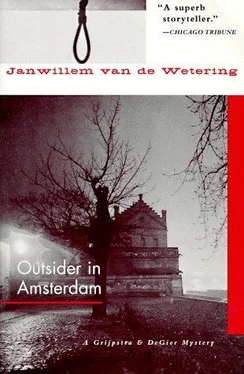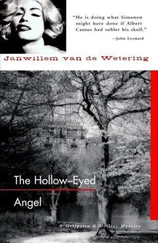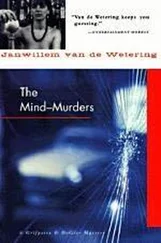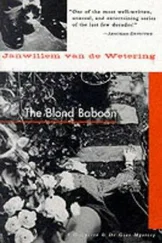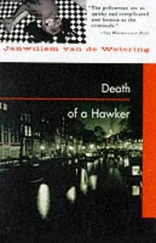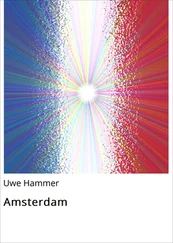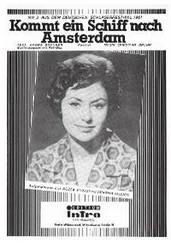Janwillem De Wetering - Outsider in Amsterdam
Здесь есть возможность читать онлайн «Janwillem De Wetering - Outsider in Amsterdam» весь текст электронной книги совершенно бесплатно (целиком полную версию без сокращений). В некоторых случаях можно слушать аудио, скачать через торрент в формате fb2 и присутствует краткое содержание. Жанр: Полицейский детектив, на английском языке. Описание произведения, (предисловие) а так же отзывы посетителей доступны на портале библиотеки ЛибКат.
- Название:Outsider in Amsterdam
- Автор:
- Жанр:
- Год:неизвестен
- ISBN:нет данных
- Рейтинг книги:4 / 5. Голосов: 1
-
Избранное:Добавить в избранное
- Отзывы:
-
Ваша оценка:
- 80
- 1
- 2
- 3
- 4
- 5
Outsider in Amsterdam: краткое содержание, описание и аннотация
Предлагаем к чтению аннотацию, описание, краткое содержание или предисловие (зависит от того, что написал сам автор книги «Outsider in Amsterdam»). Если вы не нашли необходимую информацию о книге — напишите в комментариях, мы постараемся отыскать её.
Outsider in Amsterdam — читать онлайн бесплатно полную книгу (весь текст) целиком
Ниже представлен текст книги, разбитый по страницам. Система сохранения места последней прочитанной страницы, позволяет с удобством читать онлайн бесплатно книгу «Outsider in Amsterdam», без необходимости каждый раз заново искать на чём Вы остановились. Поставьте закладку, и сможете в любой момент перейти на страницу, на которой закончили чтение.
Интервал:
Закладка:
"You were homesick," Grijpstra said.
"Perhaps. In New Guinea I was somebody. I had a uniform, arms, a task in life. I served the queen. My queen. Here you laugh about the royal family perhaps, the crown is a symbol, a symbol of the past they say, but to us in New Guinea the queen was holy. We saluted every time we passed her portrait. Religion and the law are very close. I still think the queen is a sort of saint. I cried when I saw her in the street. She was all I had when I left my island. But nobody wanted me when I came to The Hague to ask for the queen's orders. I showed them my medals and my papers. They were polite and patient, but they had no time for me. I was a strange black fellow from far away. With a Dutch passport."
"Constable first class van Meteren at your service," de Gier said.
"Exactly. Constable first class of the overseas state police. I thought it meant something. It meant nothing at all. I Spoke to the soldiers from Ambon who came to Holland instead of joining the Indonesian army as commandos and paratroopers. They were treated as I was treated. But there was a difference. They had each other. I was alone."
"That's just the way you feel," Grijpstra said, "but the feeling is wrong. You are human here, just like the rest of us. We don't discriminate against colored people in Holland. You are a Dutch citizen. You have your rights."
"Yes," van Meteren said, "an old-age pension in case I manage to reach the age of sixty-five years. You gave me a job. I became a clerk. It wasn't too bad really. I like writing. In New Guinea I would tear up a report if there was one little mistake in it. I would work overtime to get the wording exactly right. It was appreciated. But nobody appreciated what I did here."
"Now, now," Grijpstra said.
Van Meteren fingered his shoulder.
"All right. I am telling you what I used to think. Since then I have changed a lot. At that time I wanted to rejoin the police, I don't think I ever stopped being a policeman. I am an expert on all arms, including the bren. I am very good with a knife; I can throw a knife too and I learned judo. But I am not just a fighter. I know the law. By heart. Call a number and I'll recite the article to you."
"More eggs?" de Gier asked. "More coffee?"
"More coffee," van Meteren said.
"You could have gone back," de Gier said, filling the mug, careful not to step between Grijpstra and the Papuan.
"I thought about going back, but I needed money. It would have taken me a few years to save up for the ticket, but I wanted more than the ticket. I wanted to return in style."
"I don't understand this about the police," Grijpstra said. 'There are Indonesians in the Dutch police, aren't there? And Chinese too."
"No Papuans," van Meteren said. "Not one. They think we are cannibals. We'll eat the prisoners."
"So you came to Amsterdam?"
"Yes. And they gave me a job as a traffic warden. I have a cap again, and a rubber truncheon."
De Gier wanted to say something but van Meteren raised his hand.
"You are a nice man, de Gier. And very likely you are right. Perhaps I should have been content, after all, there are plenty of Dutchmen in the parking police. It's an honest job, very useful. Perhaps I am too ambitious. Don't argue with me. If you let me talk you'll have a confession. You can make notes if you like and I'll sign the statement. It'll save time."
De Gier didn't say anything.
"I was content, in a way. I didn't like The Hague. It reminded me of a cemetery, full of shadows. In Amsterdam I began to live again. People talk to each other here, even in the street, and there are a lot of Negroes in Amsterdam. I stopped feeling black. People thought I came from the colonies in South America, I didn't have to explain myself. And it got even better when I met Piet Verboom. The people of the Hindist Society accepted me.
"Yes," Grijpstra said, "Verboom. Tell us about your relationship with him."
"What do you think our relationship was?" van Meteren asked.
"Drugs." Grijpstra said. "You both dealt in drugs."
Van Meteren smiled.
"I wasn't a dealer," he said. "I was a bodyguard. Piet had convinced himself he wasn't a mere drug dealer. He had combined it with mysticism. Meditation and self-discipline were part of his ideas, but the whole process should be combined with drugs. Drugs accelerate the opening up of the mind. He kept on telling me that drugs were part of our evolution. And drugs, like mysticism, come from the Far East. It all sounded very logical when you listened to him. But drugs are dangerous, mere are a lot of criminals in the trade. He felt safer when I was around."
"And you kept your job as a traffic warden?"
"Of course," van Meteren said. "It gave me something to do during the day. A traffic warden is a respectable person. Piet's activities were always limited to the evenings and the weekends."
Van Meteren was speaking very slowly now. The pill had begun to work. De Gier lit a cigarette and gave it to him. It was very quiet on the lake, the rhythmical muffled explosions of the diesel engine created a peaceful atmosphere. Runau had relaxed, and was steering the hotter as he listened. A covey of waterfowl almost touched the mast with their wings. The coasdine had become visible.
"Not a bad life, eh?" van Meteren asked. "I have spent days in the boat like this, during the weekends mostly. I have always felt very good on the water, doing nothing in particular, watching the birds and the clouds and fishing a bit, maybe."
Grijpstra had stretched out on a bench, de Gier was sitting on the floor next to van Meteren, he was scribbling in his notebook.
"How's the yacht?" van Meteren asked Runau.
"All right. The cleaning rags have done the trick. She isn't leaking anymore and I have hosed most of the water out."
"I am really sorry," van Meteren said. "I hope I haven't ruined her."
"Don't worry," Runau said. "I came of my own free will. I knew something might happen."
"Go on," de Gier said.
Van Meteren smiled. "You want to know it all, hey? You'll get it all, all you need is a little patience."
"How do you feel now?" Grijpstra asked.
"Better. That pill must have been very strong. But let me tell you the rest of it. Piet had made a few long trips. He had been to Pakistan and he had been offered hash. Piet was a good businessman. He made a plan, got the stuff into the country and kept it for a while. He didn't want to run too much of a risk and preferred selling to a wholesaler than directly to the consumer."
"I thought he was an idealist," de Gier said.
"He was, in a way. I am sure he believed what he preached, or perhaps it was the other way around, he wanted to make a lot of money so he thought of a high-minded theory to fit his facts."
"So you hung him," de Gier said.
The Papaun's eyes fixed de Gier's.
"Yes. So I hung him. The hash was all right. I have smoked it myself. Often. Here on the lake, for instance. I don't think it does any harm. I made the contact with Beuzekom. I found him by chance. He had parked his little Mercedes bus on a sidewalk and I gave him a ticket and noticed that he had a lot of tins in the car. Ringma was with him and became very nervous when I asked about the tins. I opened one of them and they offered to bribe me but I made an appointment instead and introduced them to Piet. Piet's stuff was better and cheaper than what they had been buying so far. They bought everything Piet had to offer and asked for more. They paid cash as well."
"How much?" de Gier asked.
"A lot," van Meteren said. "Beuzekom is the most important hash dealer in Amsterdam. And he is hard to catch. He has been caught once but the man who gave his name to the police has disappeared."
"Who financed Piet's business?" Grijpstra asked.
Читать дальшеИнтервал:
Закладка:
Похожие книги на «Outsider in Amsterdam»
Представляем Вашему вниманию похожие книги на «Outsider in Amsterdam» списком для выбора. Мы отобрали схожую по названию и смыслу литературу в надежде предоставить читателям больше вариантов отыскать новые, интересные, ещё непрочитанные произведения.
Обсуждение, отзывы о книге «Outsider in Amsterdam» и просто собственные мнения читателей. Оставьте ваши комментарии, напишите, что Вы думаете о произведении, его смысле или главных героях. Укажите что конкретно понравилось, а что нет, и почему Вы так считаете.
